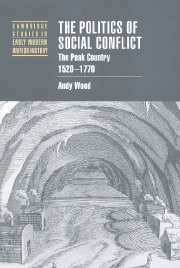Book contents
- Frontmatter
- Contents
- List of figures
- List of tables
- List of maps
- Preface
- List of abbreviations
- Introduction ‘Terms we did not understand’: landscape, place and perceptions
- 1 Social relations and popular culture in early modern England
- Part I The structures of inequality
- Part II The conditions of community
- 6 ‘The memory of the people’: custom, law and popular culture
- 7 The politics of custom
- 8 Community, identity and culture
- Part III The politics of social conflict
- Bibliography
- Index
- Cambridge Studies in Early Modern British History
6 - ‘The memory of the people’: custom, law and popular culture
Published online by Cambridge University Press: 27 July 2009
- Frontmatter
- Contents
- List of figures
- List of tables
- List of maps
- Preface
- List of abbreviations
- Introduction ‘Terms we did not understand’: landscape, place and perceptions
- 1 Social relations and popular culture in early modern England
- Part I The structures of inequality
- Part II The conditions of community
- 6 ‘The memory of the people’: custom, law and popular culture
- 7 The politics of custom
- 8 Community, identity and culture
- Part III The politics of social conflict
- Bibliography
- Index
- Cambridge Studies in Early Modern British History
Summary
CUSTOM, LAW AND POPULAR CULTURE IN EARLY MODERN ENGLAND
If social conflict helped to produce economic change in the Derbyshire Peak Country, customary law formed the terrain over which that conflict was fought. Custom defined property, and thereby underwrote social relations and cultural practice. It developed ‘at the interface between law and agrarian practice’ within local junctions of law, culture, economics and politics. As Thompson characterized it, ‘custom itself is the interface, since it may be considered both as praxis and as law.’ As such, custom was not the possession of a single social group. Rather, it represented the codification of negotiation and conflict over long periods of time. As local law, custom regulated production within village economies, defining and intermeshing forms of subordination and exploitation. Its norms and rules could be invoked by lord against tenant, rich against poor, and landed against landless. Hence, early modern social conflicts were often reducible to confrontations over the control of customary offices and institutions, or over the authentication of the local memory.
The early control acquired by miners and tenants over the language and institutions of custom in the Peak therefore represented a major achievement of local plebeian politics. That control was never total. Neither was it unproblematic. The public world of plebeian politics came to be defined as that of the settled, adult male. Those on the margins of that world – women, the unskilled, the transient – had to fight to gain a place within it.
- Type
- Chapter
- Information
- The Politics of Social ConflictThe Peak Country, 1520–1770, pp. 127 - 162Publisher: Cambridge University PressPrint publication year: 1999



